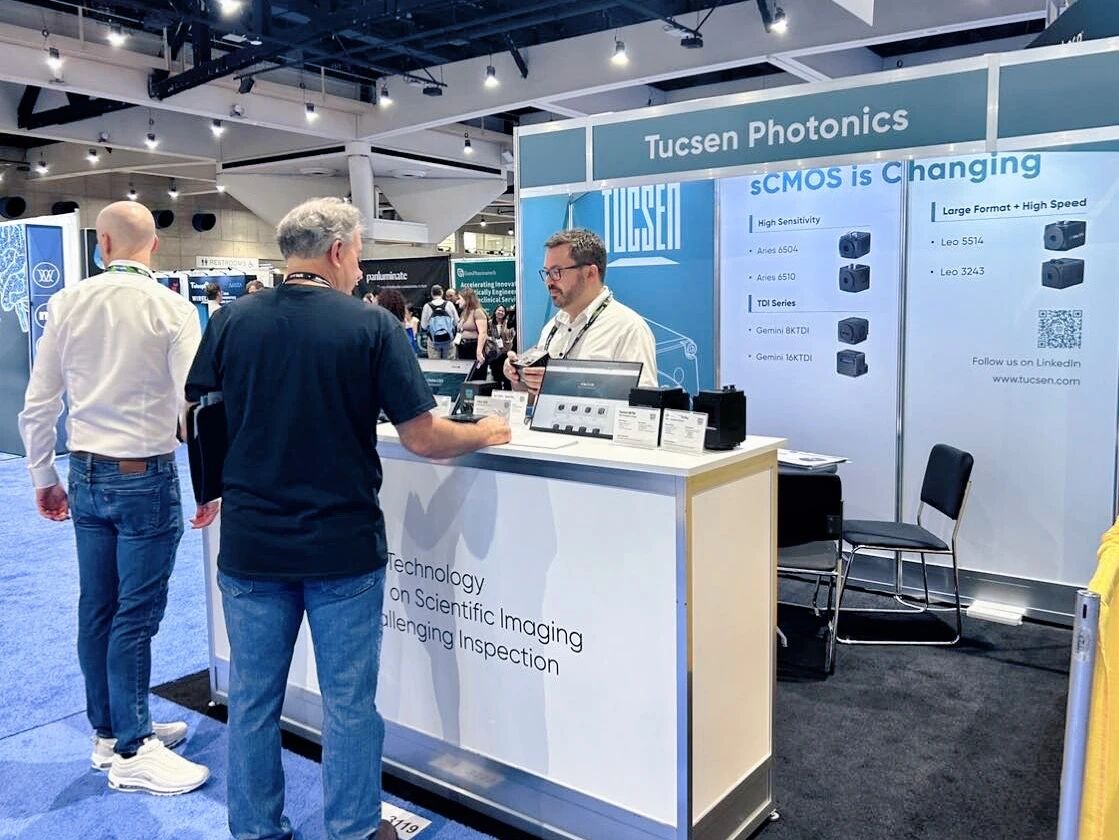In November 2025, the Society for Neuroscience (SfN) Annual Meeting—Neuroscience 2025—was held at the San Diego Convention Center. Tucsen showcased a portfolio of high-performance scientific cameras engineered for the demands of modern neuroscience research. Among them, the Aries 6504 and Leo 5514 Pro stood out, combining high sensitivity with high-speed imaging to deliver exceptional technical performance and strong application potential across a wide range of neural imaging workflows.

Aries 6504:Ultra-Sensitivity and High speed Imaging
Neuroscience experiments involving neurotransmission imaging, deep-brain fluorescence detection, or fast physiological dynamics often operate under extremely low photon conditions. Under these conditions, image signal-to-noise ratio (SNR) and high-speed acquisition become critical.
Designed for these low-light regimes, the Aries 6504 sCMOS camera offers:
● Read noise as low as 0.43 e-
● Frame rate of 300 fps@4.2 MP
● 0.001e-/p/s ultra-low dark current
This level of sensitivity enables clearer visualization of subtle physiological events previously buried in electronic noise—benefiting studies of neurotransmitter release, deep-brain fluorescence imaging, and high-speed functional imaging.
For more details on the advantages of Aries 6504 in neuroscience, please refer to
Leo 5514 Pro:Large FOV & Ultra High-Speed Imaging
Systems neuroscience increasingly requires imaging tools that combine high spatial resolution with fast temporal sampling to capture distributed neural activity across extended brain regions.
The Tucsen Leo 5514 Pro camera offers the following technical advantages:
● BSI global shutter architecture for distortion-free imaging
● 14 MP resolution supporting a 30.5 mm large FOV
● Up to 670 fps full-frame for rapid functional dynamics
The global shutter design eliminates rolling-shutter artifacts, ensuring accurate capture of fast events such as propagating activation waves or optogenetically evoked responses.
A Portfolio Supporting Diverse Scientific Imaging Workflows
Leo 3243 / 3243 Pro – Fast sCMOS with Rolling Shutter
Built on a stacked BSI sCMOS architecture, the Leo 3243 / 3243 Pro series features 3.2 μm pixels, a rolling-shutter design, and up to 100 fps at 43 MP. These capabilities make it well-suited for high-resolution, low-light cellular imaging applications that require fine spatial detail.
Please refer to our article “Leo 3243 Drives Breakthroughs in High-Throughput Imaging”. This article illustrates how the camera’s architecture performs under high-throughput experimental conditions.
Libra 3412 / 3405 – Cost-Effective Multi-Channel Imaging
The Libra 3412 / 3405 series offers a broad spectral response (350–1100 nm) and high-speed global shutter CMOS technology. These cameras support a wide range of imaging configurations, including brightfield, fluorescence, multi-camera, and multi-modal systems—making them a cost-efficient solution for diverse laboratory workflows.
Additional details on how the Libra 3405 / 3412 support high-throughput pathology system upgrades are presented in our article “Libra 3405/3412 Launch: High-Throughput Pathology Solutions”.
Gemini 8KTDI and Dhyana 9KTDI Pro: high-speed fluorescence imaging
Tucsen’s high-end TDI cameras integrate back-thinned BSI sCMOS sensors with Time Delay Integration (TDI) technology, delivering line rates up to 1 MHz (Gemini 8KTDI). These Cameras are engineered for ultra-high-throughput fluorescence imaging, including gene sequencing, digital pathology, and high-speed automated slide scanning.
For an overview of why TDI cameras have gained traction in industrial equipment upgrades, please refer to our article “Why TDI Technology is Gaining Ground".
Trusted by Researchers Worldwide
During the event, Tucsen earned strong engagement from both new and long-standing partners. One recurring comment from users emphasized:
“Our partnership with Tucsen is built on your outstanding products and comprehensive support. A question we increasingly hear from our customers is: ‘Is your system compatible with Tucsen?’ That speaks to your growing global influence.”
Tucsen team responded:
“We are committed to translating core imaging performance — sensitivity, speed, and resolution — into reliability that researchers can trust. SfN provides a valuable platform for us to collaborate with neuroscience experts and continue advancing the frontiers of brain research.”
Tucsen Photonics Co., Ltd. All rights reserved.
When citing, please acknowledge the source: www.tucsen.com


 2025/11/24
2025/11/24







